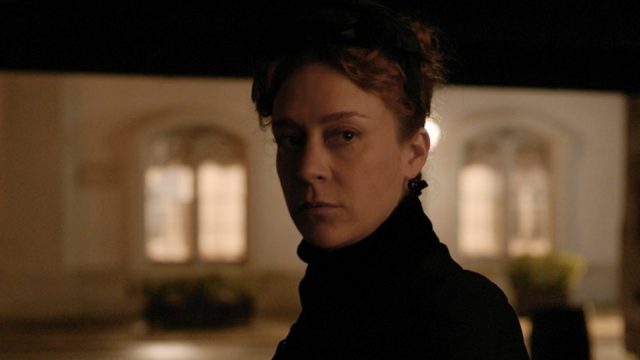Craig William Macneill’s Lizzie Borden biopic is a set of polished ingredients in search of a mess. In trying to thread some imagined needle between the prestige of Alias Grace and the visceral or even sexy appeal of a lesbian thriller, the film succeeds–only to forget to use that threaded needle to stitch anything uniquely its own.
The best part of the film is the strong central performance from Chloë Sevigny, who radiates a stunning and barely-controlled anger; Lizzie’s seizures come across as a kind of expression of the rage she cannot otherwise vent, which makes their danger to her all the more haunting. She is pent-up in a life that is too small for her, which makes her volatile, but any expression of volatility only prompts her father to narrow her confines even more. Macneill creates a stifling pressure-cooker atmosphere early on in the film, one in which violence seems embedded in every interaction and every casual cruelty.
Into that hothouse comes Bridget (Kristen Stewart), the new housemaid, who will be known to patriarch Andrew Borden (Jamey Sheridan) and his wife Abby (Fiona Shaw) as “Maggie” (all Irish girls who come into the house are given the same name for convenience’s sake, Abby explains). Also present is a horribly wasted Kim Dickens as Emma, Lizzie’s sister. It is, in short, a movie full of women, but one where the theme of their oppression hangs so heavily over the proceedings that it feels like hardly any of them are given the chance to actually become characters. This is a film that needs to enjoy itself more, to savor its Gothic touches, to allow color and life to creep into its characters. It needs, in short, to temper its feminist analysis of history with some of Parasite’s verve, allowing more of the weird, the messy, and the disreputable. The cast could absolutely handle it.
In particular, although Bridget’s increasing screen-time marks the movie’s ticking towards doom, her role is more catalyst than character–Macneill uses her as a moral index for the other characters more than he develops her in her own right, and only the self-contained quality of Stewart’s performance and Bridget’s final actions allow her to leave a mark on the film at all. The film is like a dark, moody oil painting, one that is lush but inert; it exists not to bring the past to life but to invite us to judge it.
Lizzie is available streaming on Shudder.

